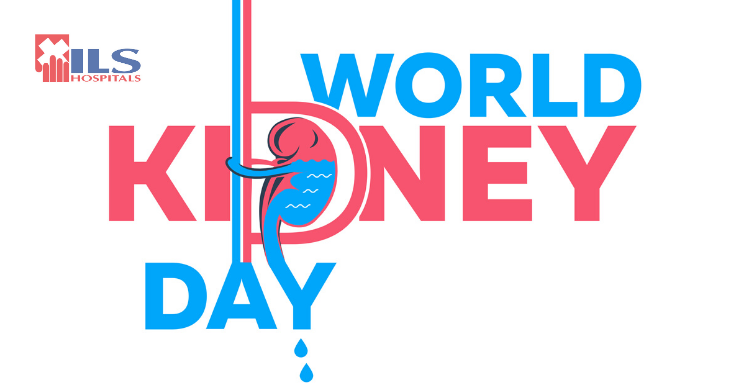Things To Do For Happy And Healthy Kidneys
Every human being has two kidneys that perform functions, like the filtration of blood, formation of urine, maintenance of fluid balance, regulation of blood pressure and other vital functions.
Chronic Kidney Disease or CKD is on the rise in our country. A man can survive with one kidney but in case of both kidney failure, the treatment options left are dialysis and kidney transplant. Therefore, well-functioning kidneys are very important. On this World Kidney Day, ILS Hospitals will share things that you must do for healthy and happy kidneys. Let’s know them.
1. Keep yourself hydrated:
The secret for healthy kidneys is drinking sufficient water. Water helps to eliminate toxins and impurities from the kidneys. Drinking enough fluids will ensure that you do not develop kidney stones and other kidney disorders. You should always drink clean and purified water. Either purify water by boiling or invest in a water purifier for the same.
2. Consume a balanced diet:
We all know the importance of a balanced diet. A balanced diet is a diet which contains several vitamins and minerals from a variety of food groups. For healthy kidneys, eat the following foods:
-
Fatty Fishes
-
Strawberries
-
Apples
-
Red bell peppers
-
Garlic
-
Onions
-
Spinach
-
Egg whites
-
Cauliflower
-
Cabbage
-
Sweet Potatoes
-
Cherries
-
Olive oil.
You should strictly avoid these foods if you want to keep your kidneys healthy.
-
Fast foods
-
Sugary foods
-
Processed foods
-
Salty foods
-
Fried and fatty foods.
3. Maintain a healthy weight:
Being overweight or obese can raise your blood pressure and blood sugar levels, thus further affecting the kidneys. Exercise and keep yourself fit for healthy kidneys.
4. Do not smoke:
Smoking increases the risk of kidney cancer. Quit this bad habit today.
5. Stop over consumption of alcohol:
Alcohol decreases the ability of kidneys to function properly. Reduce your alcohol intake to have good kidney health.
6. Do not overdose on OTC medications:
Frequent consumption of over-the-counter drugs can deteriorate your kidneys’ health. Do not take any medicines without the medical professional’s approval.
7. Get regular diagnoses:
To keep your kidneys healthy, you should keep your blood sugar and blood pressure at normal levels. Always get yourself tested from a trusted hospital. You can also choose our Renal Screening Health Package online.
Visit ILS Hospitals in Kolkata, Howrah and Agartala for optimum healthcare.
Kidney – Function and Diagnostic Tests
Kidneys are paired organs that purify the blood, controls body fluid and electrolytes and also process the waste out of the body. It is bean-shaped, of about 4 to 5 inches in length that roughly resembles the size of a fist. It sits beneath the ribs, just behind the belly. It purifies the blood by filtering them, from where it absorbs back the minerals, salts, and water, and removes the waste in the form of urine.
Detecting any kidney illness in its early stage is very tricky as even 10 percent of the functioning kidney does a pretty good job. Thus, only best hospitals can offer a quality diagnosis of the kidney. At ILS Hospitals, we offer the following renal diagnostics for providing a quality treatment for any malfunction of kidneys.
1. Kidney ultrasound
The test is carried out by placing the probe transmitting sound waves over the waist. The sound wave gets reflected from the kidney to cast an image. This can help to find the existence of any stones, lumps, cysts or block in the kidney.
2. Urinalysis
It is a routine visual screening of kidney that can be done both by tools or pathologist himself through a microscope. It can help to detect minute signs of kidney damage such as bleeding, infections, or inflammation etc.
3. Ureteroscopy
It is a kind of endoscopy, specific for screening for kidney and its associated organs. The flexible endoscopic is inserted through the urethra into the bladder and then into the ureters. Even though the endoscope does not reach the kidney itself, it helps to detect any possible complications associated with them.
4. Computed tomography
More commonly known as the CT scan is helpful for diagnosis kidneys as well. The scanner captures the detailed X-ray images of the kidney in a series and it is then fed to the computer to analyze any abnormality in the kidneys.
5. Magnetic Resonance Imaging
More commonly known as MRI uses radio waves and magnetic field to yield a high-resolution image of the kidney to detect any abnormality in it.
6. Kidney biopsy
A fine needle is used to extract a small amount of tissue to observe it under a microscope. It can detect the possibility of malignancy in the kidney.
7. Blood and urine test
A sample of blood and urine is extracted and screened for possible infection and microbial growth.
On this month of March, when we observed World Kidney Day, we, at ILS Hospitals encourage every individual to keep a close eye on their respective renal health.












